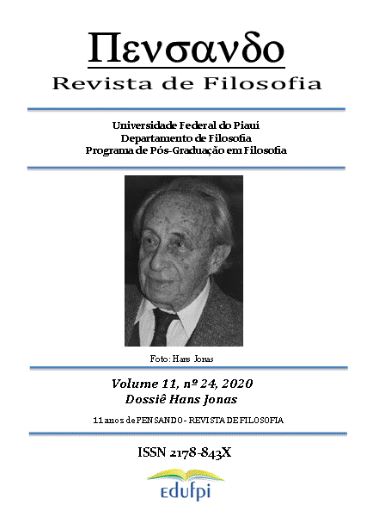THE ANTHROPOCENE OR THE ‘END’ OF THE IMPERATIVE RESPONSIBILITY
DOI:
https://doi.org/10.26694/pensando.v11i24.11139Palabras clave:
imperativo responsabilidade, Antropoceno, ética (ética ambiental), antropocentrismo, filosofia da tecnologia, liberação (Gelassenheit)Resumen
My paper aims to sketch the Paradox of Omni-responsibility, namely the ethical paradox that emerges from the so-called Anthropocene considered as our current epochal framework. The main outcome of this paradox is the overcoming of Hans Jonas’s principle/imperative responsibility as an ethical standard for ecological (and more generally, philosophical) thought over recent decades. if the imperative responsibility has been the cornerstone of an “ethics for the technological age”, it probably cannot play the same role in the anthropocenic/technocenic age. My argument proceeds as follows. The first stage deals with a critical dissection of the Anthropocene as “discourse” (§ 1); the second stage introduces the Pet-tification of Nature (i.e. the characterization of the planetary organism as a pet), the Aidosean Prometheanism (i.e. a new form of anthropocentrism) and the Paradox of Omni-responsibility as basic outcomes of the anthropocenic framework (§ 2); in the third and final stage, I will draw my conclusions concerning the redefinition of Anthropo-cene as Techno-cene and the proposal of a renewed ethical dialogue between responsibility and releasement, that is between Jonas and Heidegger (§ 3).
Citas
ANDERS, Günther. (1980) 1992. Die Antiquiertheit des Menschen 2. Über die Zerstörung des Lebens im Zeitalter der dritten industriellen Revolution, München: Beck.
BASKIN, Jeremy. 2015. “Paradigm Dressed as Epoch: The Ideology of the Anthropocene.” Environmental Values 24: 9-29.
BASKIN, Jeremy. 2019. Geoengineering, the Anthropocene and the End of Nature. New York: Palgrave Macmillan.
BONNEUIL, Christophe, and FRESSOZ, Jean-Baptiste. 2016. The Shock of the Anthropocene: The Earth, History and Us, trans. D. Fernbach. London: Verso.
CLARK, Timothy. 2015. Ecocriticism on the Edge: The Anthropocene as a Threshold Concept, London/New York: Bloomsbury.
CRIST, Eileen. 2013. “On the Poverty of our Nomenclature.” in Environmental Humanities 3: 129-47.
CRUTZEN, Paul, and STOERMER, Eugene F.. 2000. “The Anthropocene.” Global Change Newsletter (41): 17-18 http://www.igbp.net/download/18.316f18321323470177580001401/1376383088452/NL41.pdf)
HAMILTON, Clive, 2017. Defiant Earth: The Fate of Humans in the Anthropocene. Sidney/Melbourne/Auckland/London: Allen & Unwin.
HEIDEGGER, Martin (1959) 1966. Discourse on Thinking: A Translation of Gelassenheit, trans. J. M. Anderson and E. H. Freund. New York: Harper & Row.
HEIDEGGER, Martin (1953) 1977. “The Question Concerning Technology.” In The Question Concerning Technology and Other Essays, trans. W. Lovitt, 3-35. New York & London: Garland.
HORNBORG, Alf. 2015. “The Political Ecology of the Technocene: Uncovering ecologically unequal exchange in the world-system.” In C. Hamilton, Ch. Bonneuil & F. Gemenne (eds), The Anthropocene and the Global Environmental Crisis: Rethinking Modernity in a New Epoch, 57-69. Routledge: New York.
JONAS, Hans (1979) 2003. “Toward a Philosophy of Technology.” In R. C. Scharff / V. Dusek (eds), Philosophy of Technology. The Technological Condition: An Anthology, Blackwell: Oxford, 191-204.
JONAS, Hans (1979) 1985. The Imperative of Responsibility: In Search of an Ethics for the Technological Age, trans. H. Jonas and D. Herr. Chicago / London: University of Chicago Press.
JONAS, Hans. 1981. “Reflections on Technology, Progress, and Utopia.” Social Research 48, 3: 411-455.
JONAS, Hans. 1982. “Technology as a Subject for Ethics.” Social Research 49, 4: 891-898.
LEDDA, Gavino (1975) 1979 My Father My Master, trans. G. Salmanazar. New York: Urizen Books.
LOVELOCK, James (1979) 2000. Gaia: A New Look at Life on Earth (3rd ed.). Oxford (Ma): Oxford University Press.
LÖWITH, Karl (1967) 1986. “Gott, Mensch und Welt in der Metaphysik von Descartes bis zu Nietzsche.” In Sämtliche Schriften Band 9, hrsg. von H. Ritter, 1-194. Stuttgart: Metzler.
NANCY, Jean-Luc (in conversation with John Paul Ricco) 2015. “The Existence of the World Is Always Unexpected” (trans. J. Malecki), Davis, H. & Turpin, E. (eds), Art in the Anthropocene: Encounters among Aesthetics, Politics, Environments and Epistemologies, 85-92, London: Open Humanities Press.
RAFFNSØE, Sverre. 2016. Philosophy of the Anthropocene: The Human Turn. New York: Palgrave Macmillan.
SCHELLNHUBER Hans Joachim. 1999. “Earth system’ analysis and the second Copernican revolution.” Nature, 402, 2 December 1999: 19-23.
SCHWÄGERL, Christian (2011) 2014. The Anthropocene: The Human Era and How It Shapes Our Planet. Santa Fe: Synergetic Press.
SLOTERDIJK, Peter 2015. “The Anthropocene: A Process-state at the Edge of Geohistory?” (trans. A.-S. Springer), Davis, H. & Turpin, E. (eds), Art in the Anthropocene, 327-340.
STEFFEN, Will, CRUTZEN, Paul J. and MCNEILL, John R. 2007. “The Anthropocene: Are Humans Now Overwhelming the Great Forces of Nature?” Ambio 36: 614-621.
STEFFEN, Will, CRUTZEN, Paul J., et al. 2011a. “The Anthropocene: From Global Change to Planetary Stewardship.” Ambio 40: 739-761 (doi: 10.1007/s13280-011-0185-x).
STEFFEN, Will, CRUTZEN Paul J., et al. 2011b. “The Anthropocene: Conceptual and Historical Perspectives.” Philosophical Transactions of the Royal Society A, 369: 842-867.
STEGER Manfred B. 2009. Globalisms: The Great Ideological Struggle of the Twenty-first Century, third edition, New York/Toronto: Rowman & Littlefield.

























